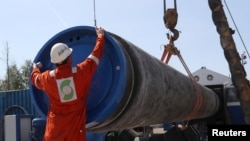Russia resumed construction on a gas pipeline to Germany on Friday, one year after the United States opposed the joint international project because of possible threats to Europe’s energy security, project managers said.
Work on the Nord Stream 2 pipeline was suspended in December 2019 after it became a source of conflict between Russia and the West.
Nord Stream 2 is intended to double the annual gas capacity of the existing Nord Stream pipeline.
In a statement, Nord Stream 2 officials confirmed construction had resumed under the Baltic Sea, saying "the pipelay vessel Fortuna will lay a 2.6-kilometer section of the pipeline in the German Exclusive Economic Zone in water depths of less than 30 meters."
Germany’s maritime authority notified shippers to avoid part of the Baltic Sea where the Nord Stream 2 will be built until December 31.
Work on the 100-kilometer undersea pipeline is 90% complete.
When finished, Nord Stream and Nord Stream 2, which bypass Ukraine, will be responsible for the transfer of more than half of Russia’s total gas exports to Europe.
Washington had criticized Europe for its overdependence on Russian energy and threatened sanctions against European partners in the pipeline project.
The majority stakeholder in the project, Russian gas giant Gazprom, together with its European partners, Germany's Wintershall and Uniper groups, the Dutch-British giant Shell, France's Engie and Austria's OMV, will spend about $11.5 billion on the project.
Gazprom's stock value rose 3.5% Friday on the Moscow stock exchange.





